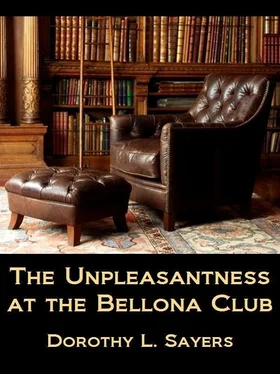“Ah! very nice indeed,” said Dr. Horner, appreciatively, as the corpse was disengaged from the coffin and transferred to the table. “Excellent. Not much difficulty over this job. That’s the best of getting on to it at once. How long has he been buried, did you say? Three or four weeks? He doesn’t look it. Will you make the autopsy or shall I? Just as you like. Very well. Where did I put my bag? Ah! thank you, Mr. — er — er—” (An unpleasantly-occupied pause, during which George Fentiman escaped, murmuring that he thought he’d have a smoke outside). “Undoubted heart trouble, of course, I don’t see any unusual appearances, do you?… I suppose we’d better secure the stomach as it stands… pass me the gut, would you? Thanks. D’you mind holding while I get this ligature on? Ta.” (Snip, snip.) “The jars are just behind you. Thanks. Look out! You’ll have it over. Ha! ha! that was a near thing. Reminds me of Palmer, you know — and Cook’s stomach — always think that a very funny story, ha, ha! — I won’t take all the liver — just a sample — it’s only a matter of form — and sections of the rest — yes — better have a look at the brain while we are about it, I suppose. Have you got the large saw?”
“How callous these medical men seem,” murmured Mr. Murbles.
“It’s nothing to them,” said Wimsey. “Horner does this kind of job several times a week.”
“Yes, but he need not be so noisy. Dr. Penberthy behaves with decorum.”
“Penberthy runs a practice,” said Wimsey with a faint grin. “He has to exercise a little restraint over himself. Besides, he knew old Fentiman, and Horner didn’t.”
At length the relevant portions of General Fentiman’s anatomy having been collected into suitable jars and bottles, the body was returned to the coffin and screwed down. Penberthy came across to Wimsey and took his arm.
“We ought to be able to get a pretty good idea of what you want to know,” he said. “Decomposition is very little advanced, owing to an exceptionally well-made coffin. By the way” (he dropped his voice) “that leg, you know — did it ever occur to you — or rather, did you ever discover any explanation of that?”
“I did have an idea about it,” admitted Wimsey, “but I don’t yet know whether it was the right one. I shall probably know for certain in a day or two.”
“You think the body was interfered with?” said Penberthy, looking him steadily in the face.
“Yes, and so do you,” replied Wimsey, returning the gaze.
“I’ve had my suspicions all the time, of course. I told you so, you know. I wonder whether — you don’t think I was wrong to give the certificate, do you?”
“Not unless you suspected anything wrong with the death itself,” said Wimsey. “Have you and Horner noticed anything queer?”
“No. But — oh, well! having patients dug up always makes me worried, you know. It’s easy to make a mistake and one looks an awful fool in court. I’d hate being made to look a fool just at present,” added the doctor with a nervous laugh. “I’m thinking of — great Scott, man! how you startled me!”
Dr. Horner had brought a large, bony hand down on his shoulder. He was a red-faced, jovial man, and he smiled as he held up his bag before them.
“All packed up and ready,” he announced. “Got to be getting back now, aha! Got to be getting back.”
“Have the witnesses signed the labels?” asked Penberthy, rather shortly.
“Yes, yes, quite right. Both the solicitor johnnies, so they can’t quarrel about that in the witness-box,” replied Horner. “Come along, please — I’ve got to get off.”
They found George Fentiman outside, seated on a tombstone, and sucking at an empty pipe.
“Is it all over?”
“Yes.”
“Have they found anything?”
“Haven’t looked yet,” broke in Horner, genially. “Not at the part which interests you, that is. Leave that for my colleague Lubbock, you know. Soon give you an answer — say, in a week’s time.
George passed his handkerchief over his forehead, which was beaded with little drops of sweat.
“I don’t like it,” he said. “but I suppose it had to be done. What was that? I thought — I’d swear I saw something moving over there.”
“A cat, probably,” said Penberthy, “there’s nothing to be alarmed at.”
“No,” said George, “but sitting about here, one — fancies things.” He hunched his shoulders, squinting round at them with the whites of his eyeballs showing.
“Things,” he said, “people — going to and fro… and walking up and down. Following one.”
Chapter XIV
Grand Slam in Spades
On the seventh morning after the exhumation — which happened to be a Tuesday — Lord Peter walked briskly into Mr. Murbles’ chambers in Staple Inn, with Detective-Inspector Parker at his heels.
“Good morning,” said Mr. Murbles, surprised.
“Good morning,” said Wimsey. “Hark! hark! the lark at heaven’s gate sings. He is coming, my own, my sweet, were it ever so airy a tread. He will be here in a quarter of an hour.”
“Who will?” demanded Mr. Murbles, somewhat severely.
“Robert Fentiman.”
Mr. Murbles gave a little ejaculation of surprise.
“I had almost given up hope in that direction,” he said.
“So had not I. I said to myself, he is not lost but gone before. And it was so. Charles, we will lay out the pièces de conviction on the table. The boots. The photographs. The microscopic slides showing the various specimens. The paper of notes from the library. The outer garments of the deceased. Just so. And Oliver Twist! Beautiful. Now, as Sherlock Holmes says, we shall look imposing enough to strike terror into the guilty breast, though armed in triple steel.”
“Did Fentiman return of his own accord?”
“Not altogether. He was, if I may so express myself, led. Almost, in fact, led on. O’er moor and fen, o’er crag and torrent till, don’t you know. What is that noise in the outer room? It is, it is the cannon’s opening roar.”
It was, indeed, the voice of Robert Fentiman, not in the best of tempers. In a few seconds he was shown in. He nodded curtly to Mr. Murbles, who replied with a stiff bow, and then turned violently upon Wimsey.
“Look here, what’s the meaning of all this? Here’s that damned detective fellow of yours leading me a devil of a dance all over Europe and home again, and then this morning he suddenly turns round and tells me that you want to see me here with news about Oliver. What the devil do you know about Oliver?”
“Oliver?” said Wimsey. “Oh, yes he’s an elusive personality. Almost as elusive in Rome as he was in London. Wasn’t it odd, Fentiman, the way he always seemed to bob up directly your back was turned? Wasn’t it funny, the way he managed to disappear from places the moment you set foot in ’em? Almost like the way he used to hang about Gatti’s and then give you and me the slip. Did you have a jolly time abroad, old man? I suppose you didn’t like to tell your companion that he and you were chasing a will o’ the wisp?”
Robert Fentiman’s face was passing through phases ranging from fury to bewilderment and back again. Mr. Murbles interrupted.
“Has this detective vouchsafed any explanation of his extraordinary behaviour, in keeping us in the dark for nearly a fortnight as to his movements?”
“I’m afraid I owe you the explanation,” said Wimsey, airily. “You see, I thought it was time the carrot was dangled before the other donkey. I knew that if we pretended to find Oliver in Paris, Fentiman would be in honour bound to chase after him. In fact, he was probably only too pleased to get away — weren’t you, Fentiman?”
Читать дальше












